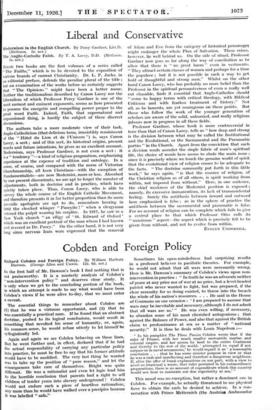Liberal and Conservative
NIodernism in the English Church. By Percy Gardner, Litt.D. (Methuen. 5s. net.) The Anglo-Catholic Faith. By T. A. Lacey, D.D. (Methuen. 5s. net.) 5s. net.) Timm two books are the first volumes of a series called The Faiths," which is to be devoted to the exposition of various brands of current Christianity. Dr. L. P. Jacks, in an editorial preface, defends the peculiar plural of the title ; but an examination of the works before us certainly suggests that " The Opinions " might have been a better name. Neither the traditionalism described by Canon Lacey nor the Liberalism of which Professor Percy Gardner is one of the most earnest and eminent exponents, seems as here presented to possess the energetic and compelling power proper to the great word Faith. Indeed, Faith, that supernatural and impassioned thing, is hardly the subject of these discreet discussions.
The authors take a more moderate view of their task. Anglo-Catholicism (that delicious term, irresistibly reminiscent of the " Hotel du Lion et de l'Univers ") is, says Canon Lacey, a sect ; and of this sect, its historical origins, present tenets and future intentions, he gives us an excellent account. Modernism, says Professor Gardner, is not even a sect : it is a " tendency "—a kind of religious pragmatism, emphasizing experience at the expense of tradition and ontology. In a sense, of course, and compared with the norm of Victorian Churchmanship, all keen Christians—with the exception of Fundamentalists—are now Modernist, more or less. Absorbed by our present discontents, we are apt to forget the number of adjustments, both in doctrine and in practice, which have quietly taken place. Thus, Canon Lacey, who is able to survey the whole course of the English Catholic Movement, and therefore presents it in far better proportion than its more juvenile apologists are apt to do, remembers hearing in 1862 the shocked whisper " Puseyite I " when a clergyman entered the pulpit wearing his surplice. In 1917, he saw in a New York church " an effigy of St. Edward of Oxford ' which was an excellent portrait of the man whom I had known and revered as Dr. Pusey." On the other hand, it is not very long since nervous fears were expressed that the removal of Adam and Eve from the category of historical personages might endanger the whole Plan of Salvation. These crises, however, lie well behind us. On the side of ritual, Professor Gardner now goes so far along the way of conciliation as to allow that there is " no. great harm " even in vestments. " They attract certain classes of women and perhaps for a time the populace ; but it is not possible in such a way to get hold of thoughtful and strong men." Whilst on the other hand Canon Lacey, who has probably no more belief than the Professor in the spiritual persuasiveness of even a really well cut chasuble, finds it essential that Anglo-Catholics should " come to happy terms with critical theology, with Biblical Criticism and with fearless treatment of history." Not all, as he laments, are yet courageous on these points. But those who follow the work of the younger generation of scholars are aware of the solid, unhurried, and really religious labours now in progress in all these fields.
Professor Gardner, Whose book is mote controversial in . tone than that of Canon Lacey, tells us " how deep and strong is the division between what may be called the Institutional and the Evolutional, or the Sacramental and the Pneumatic parties " in the Church. Apart from the conviction that such a division rends asunder the single fabric of man's spiritual life, the choice of words here seems to elude the main issue ; since it is precisely where we touch the genuine world of spirit that the evolutional view of religion ceases to be adequate to the facts. " The doctrine summarily put forth in this little work," he says again, " is that the essence of religion, of the Christian religion as of all others, is spirit working from within, not imposed from without." Here, in one sentence, the chief weakness of the Modernist position is exposed ; namely, its excessive immanentism, its lack of transcendental feeling. Surely the antithesis between inward and outward here emphasized is false ; as in the sphere of practice the antithesis between the sacramental and pneumatic is false. For no account of religion can be complete which fails to give a central place to that which Professor Otto calls its " numinous " aspect—the aspect which is precisely felt to be given from without, and not to evolve from within.
EVELYN UNDERIIILL.














































 Previous page
Previous page